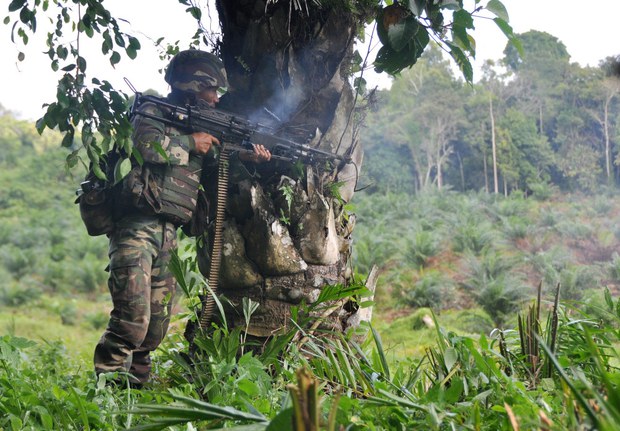Philippine, Malaysian Top Diplomats Trade Angry Words over Sabah
2020.07.30
Manila and Cotabato, Philippines
 In a photo released by the Ministry of Defense, a Malaysian soldier fires a machinegun during a gunfight with Filipino militants in the Sungei Nyamuk area of Sabah, Malaysia, March 12, 2013.
In a photo released by the Ministry of Defense, a Malaysian soldier fires a machinegun during a gunfight with Filipino militants in the Sungei Nyamuk area of Sabah, Malaysia, March 12, 2013.
The Philippines and next-door neighbor Malaysia are engaged in a diplomatic spat, with tit-for-tat verbal sparring and the summoning of ambassadors, after Manila’s foreign secretary revived old claims that the Malaysian state of Sabah is part of Philippine territory.
On Thursday, Philippine Foreign Secretary Teodoro Locsin Jr. said he had summoned Malaysia’s envoy here after Kuala Lumpur’s foreign minister criticized Manila’s top diplomat over his earlier statement regarding Filipino territorial claims to Sabah, a region in Malaysian Borneo that lies close to the Sulu Islands in the southern Philippines. The issue has been a longtime thorn in bilateral relations.
“No country can tell another what it can and cannot say about what the latter regards as rightfully its own,” Locsin said in his latest verbal salvo.
He emphasized that, just as the Philippines does in asserting its ownership rights in its territorial dispute with China in the South China Sea, it would do the same with Philippine claims in Sabah.
“It is free to say what it wants while we say and do what needs doing. That holds for Sabah,” Locsin, who is known for his blunt messages posted on social media, said via Twitter.
“And that’s China we’re talking about – the second biggest economy and military power in the 21st century. I am summoning the Malaysian ambassador,” he added.
The controversy erupted earlier this week after Locsin expressed his displeasure on social media about a statement circulated on Twitter by the U.S. Embassy that referred to Sabah as part of Malaysia. The Philippines maintains a historical claim over Sabah, which Malaysia incorporated in the 1960s, although Kuala Lumpur still pays a token rent to the heirs of the sultanate of Sulu.
“Sabah is not in Malaysia if you want to have anything to do with the Philippines,” Locsin said on Monday.
The American Embassy did not immediately respond when BenarNews contacted for comment.
Locsin’s first message prompted his Malaysian counterpart, Hishammuddin Hussein, to fire back by saying he would summon the Philippine ambassador to Kuala Lumpur over Locsin’s comments.
“This is an irresponsible statement that affects bilateral ties,” Hishammuddin said Wednesday in a tweet. [The Ministry of Foreign Affairs] will summon the Philippine Ambassador on Monday to explain. Sabah is, and will always be, part of Malaysia.”
On Thursday, Philippine presidential spokesman Harry Roque waded into the issue as he sought to calm frayed nerves. He stressed that Sabah had long been acknowledged by the government as part of the Philippines.
“We recognize that this matter should not affect our own ongoing bilateral ties with Malaysia,” he said. “It has not affected it in the recent years, and we will continue to have healthy bilateral relations with Malaysia despite the issue of Sabah.”
2013 violence
Sabah has always been a point of contention between the two neighbors.
Seven years ago, some 200 armed militants from the southern Philippines, who called themselves members of the “Royal Sulu Army” and claimed to be followers of Jamalul Kiram III, the self-proclaimed rightful heir of the sultan of Sulu, assembled a flotilla and sailed to Sabah in a failed bid to retake the territory.
His men hunkered in a village in Lahad Datu, and engaged Malaysian authorities in gunbattles that lasted weeks and left more than 50 militants and some 10 Malaysian police dead.
The gunmen demanded that Malaysia recognize them as representatives of the Sulu Sultanate, which used to rule Sabah.
Founded in 1405, the Sultanate of Sulu ruled the islands in the Sulu Archipelago, parts of Mindanao in the southern Philippines and parts of Borneo, including Sabah, until about the early 1800s. Sabah was incorporated into Malaysia in 1963, but the country still pays token rent to the Sulu Sultanate on an annual basis.
Many Filipinos migrated to Sabah during the 1970s to escape from armed conflict between government forces and secessionist guerrillas in the southern Philippines.
More than 800,000 people of Filipino ancestry still live in Sabah, whose population is more than 3.5 million.







